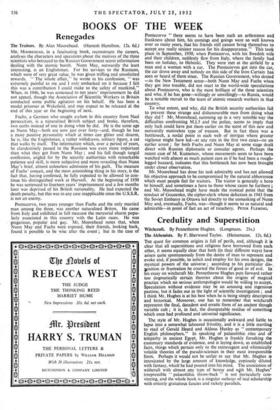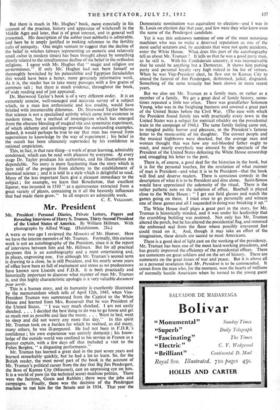Credulity and Superstition
Witchcraft. By Pennethome Hughes. (Longman. 21s.) The Alchemists. By F. Sherwood Taylor. (Heinemann. 12s. 6d.) THE quest for common origins is full of perils, and, although it is clear that all superstitions and religions have borrowed from each other, it seems equally clear that both (in their different ways) have arisen quite spontaneously from the desire of man to represent and evoke and, if possible, to solicit and employ for his own designs, the mystical powers of the universe; according to his particular dis-, aosition or frustration he courted the forces of good or of evil. In his essay on witchcraft Mr. Pennethorne Hughes puts forward rather too dogmatically certain theories about the origins of magical practice which no serious anthropologist would be willing to accept. Speculation without evidence may be an amusing and ingenious pastime,- but it fades out in the light of scientific investigation ; and I think Mr. Hughes is at his best when he is being simply descriptive and historical. Moreover, one has to remember that witchcraft represents the final, decadent and erratic form of an ancient though variable cult - it is, in fact, the disreputable residue of something which once had profound and universal significance.
The style of Mr. Hughes is occasionally awkward and liable to lapse into a somewhat laboured frivolity, and it is a little startling to read of Gerald Heard and Aldous Huxley as " contemporary English philosophers." In speaking of palaeolithic rites and of telepathy in ancient Egypt, Mr. Hughes is frankly forsaking the customary standards of evidence, and is laying down, as established facts, things which pertain only to the extravagant and whimsically volatile theories of the pseudo-sciences in their most irresponsible form. Perhaps it would not be unfair to say that Mr. Hughes is intoxicated by the large amount of knowledge, copiously diluted with fantasy, which he had poured into his mind. The association of withcraft with almost any type of heresy and with Mr. Hughes' irrepressible " palaeolithic throw-back " is not particularly con- vincing, and the whole book is a singular mélange of real scholarship with entirely gratuitous fancies and rickety parallels. But there is much in Mr. Hughes' book, more especially in his account of the practice, history and apparatus of witchcraft in the Middle Ages and later, that is of great interest, and in general well presented. His description of the sabbat (not Sabbath) is admirable, and here he is amply justified in making reference to the fertility cults of antiquity. One might venture to suggest that the decline of the belief in witches (always representing an esoteric and relatively small cultus i
us n modern times) has been brought about by something closely related to the simultaneous decline of the belief in the orthodox religions. I agree with Mr. Hughes that " magic and religion are co-terminus." If only Mr: Hughes had, not been himself so thoroughly bewitched by his palaeolithic and Egyptian faradaddles this would have been a better, more genuinely informative work. As it is, the reader has to take many passages with a few grains of common salt ; but there is much evidence, throughout the book, of wide reading and of just appraisal.
Dr. Sherwood Taylor's book is of a very different order. It is an extremely concise, well-managed and accurate survey of a subject which, to a man less enthusiastic and less erudite, would have bristled with innumerable dilemmas. Dr. Sherwood Taylor believes that science is not a specialised activity which came into existence in modern times, but a method of investigation which has emerged from the obscure blending of magical rite and systematic experiment, of which alchemy and astrology provide the outstanding examples. Indeed, it would perhaps be true to say that man has moved from superstition to knowledge by the way of experiment ; his belief in the occult has been ultimately superseded by his confidence in rational empiricism.
This, in fact, is that rare thing—a work of great learning, admirably condensed, which can be read with pleasure by everyone. At every stage Dr. Taylor produces his authorities, and his illustrations are dependable. No story is more fascinating than the story which is here told of the progress from alchemy to the establishment of chemical science ; and it is told in a style which is delightful to read. Many of the less important facts give a pleasant immediacy to the subject ; for example, we learn that Benedictine, that excellent liqueur, was invented in 1510 " as a quintessence extracted from a great variety of plants, containing in it all the heavenly influences that had made them grow." In all respects an admirable work.
C. E. VuU.iAs,tY.



































 Previous page
Previous page